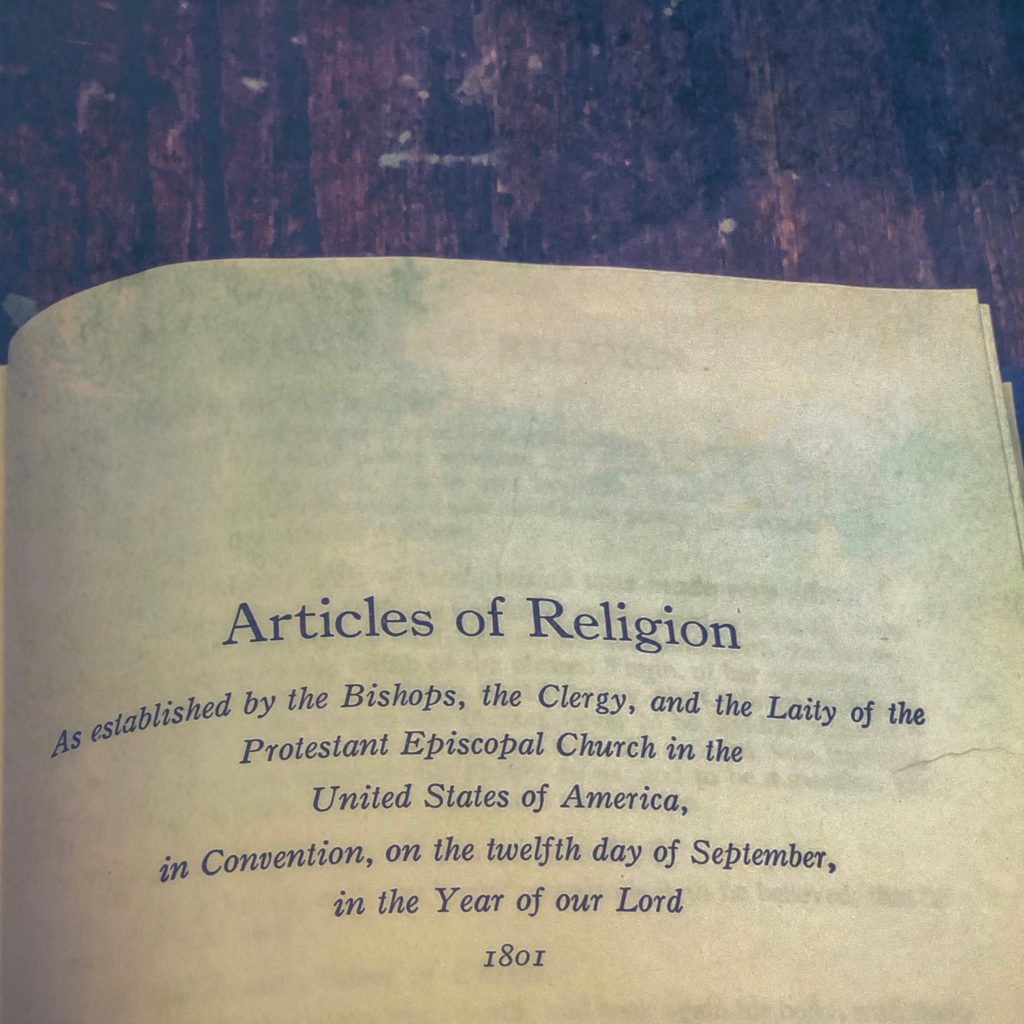
As we confess that vain and rash Swearing is forbidden Christian men by our Lord Jesus Christ, and James his Apostle, so we judge, that Christian Religion doth not prohibit, but that a man may swear when the Magistrate requireth, in a cause of faith and charity, so it be done according to the Prophet’s teaching in justice, judgment, and truth.
by Edward Watson
Article 39 gets scant attention in the commentaries (surely the pinnacle and climax of the whole, that to which we have been building towards all along…). For the most it’s merely noted that the article asserts the propriety of Christians swearing oaths in secular court, appeals to Matthew 5:33-37 and James 5:12 notwithstanding. And it is sometimes asserted that this was to contradict Anabaptist extremism, which made Christian participation in secular legal matters a bit difficult.
Despite the sparseness of the commentary I’ve been able to find, however, there are several weighty theological mechanisms at work here. I’m going to briefly outline three of them—namely, the mode of exegesis; assumptions regarding the relationship between Christian Religion and magistrate; and Christian responsibility to any given legal apparatus—then end by suggesting how this might inform contemporary practice.
Exegesis
Article 39 exemplifies the long-standing Christian practice of complicating simple Bible prescriptions in light of complicated times. Matthew 5:33-37 is pretty unequivocal:
you have heard that it was said to those of ancient times, ‘You should not swear falsely but carry out the vows you have made to the Lord.’ But I say to you, Do not swear at all, either by heaven, for it is the throne of God, or by the earth, for it is his footstool or by Jerusalem, for it is the city of the great King. And do not swear by your head, for you cannot make one hair white or black. Let you word be ‘Yes, Yes’ or ‘No, No’; anything more than this comes from the evil one.
This does not leave a lot left to swear by, and one can safely assume that Jesus’ exhaustiveness is supposed to indicate a total proscription. James 5:12, meanwhile, is equally stern. James concludes his invocation to remain patient and steadfast in suffering by imploring “above all, my beloved, do not swear, either by heaven or by earth or by any other oath, but let your ‘Yes’ be yes and your ‘No’ be no, so that you may not fall under condemnation.”
In both cases, then, swearing any oath for any reason by any thing is prohibited. In the one case, any oath comes from the Devil. On the other, it brings the swearer under condemnation. Nonetheless, the law of the land require oaths to be sworn for the magistrate to do their work—legal systems require the ritualization of performative utterances to reify their otherwise intangible powers. And since the Church of England is committed to the law of the land, there must be a way of allowing this.
This should not be read simplistically as subordinating the biblical interpretation to extra-biblical concerns. After all, the state itself and its laws were often seen as a Biblically grounded good (c.f. William Tyndale’s The Obedience of a Christian Man, for example). And rather than overtly prioritizing the secular court over God’s Word, the article reads the Bible with itself to carve out room a qualification. It does not deny the import of these passages, but sets them against Jeremiah 4:2—”if you swear ‘as the Lord lives!’ in truth, in justice, and in uprightness, then nations shall be blessed by God, and by God they shall boast”—so that a principled exception is thrown into relief.
This passage thus illuminates a pattern of exegesis whereby practical concerns influence how different biblical passages are set and weighed against each other to articulate a coherent principle which cannot be derived from either in isolation. That is, it illuminates the mechanisms behind how the unity of the Scriptural witness is articulated. Irrespective of whether these mechanisms should be at work—and there are times when they give rise to death-dealing versions of faith—it is more or less undeniable that Biblical exegesis has always been inflected by the ultimate concerns of the day. As such, it is also true that these concerns have given rise to the drawing of different relations, the different weighting of different related passages, and so to different ‘wholes’ constituted by the same raw material. The Bible is not and can never be just ‘one’ totality. And which totality it is can never be independent of what most concerns those trying to read it faithfully, whether these concerns are in keeping with the Christian witness or not.
Christian Religion and Magistrate
The dynamics between political and Christian faithfulness driving this exegesis are given concrete form in the relationship between ‘Christian Religion’ and ‘the Magistrate.’ It is not to much to say that there is some kind of Two Cities picture at work, as the City of God negotiates with the strictures of 16th century London. It is also probably possible to paint some sort of ‘Christ and/over/above/below/within/against culture’ picture within Article 39.
It is more interesting here to focus on the granular relations within this particular relationship, however, than a more abstract picture—not least because this lends more meat to the exegetical principles at work. We have the Magistrate ‘requiring,’ a term with multiple resonances. On the one hand, to say ‘I require’ can be a veiled command; one might call to mind, for example, the frontispiece of British passports, stating with an all too imperial confidence that ‘her Britannic Majesty’s Secretary of State requests and requires’ that the bearer be allowed free passage. On the other, it can be a term of real need; I require food, friendship, grace, and my requiring is not articulated from a position of strength. Then we have the Christian religion, which does not ‘prohibit,’ but which allows, that this act be done according to the Prophet’s teaching.
The implication, of course, is that such prohibition is the province of this religion—that if the magistrate gets what they require, it is because the Christian religion allows it. And in this implication, in the interplay of requirement and prohibition, each term is folded over in its ambiguity. The ‘requirement’ of the law may well be that of the British passport. After all, the application of this law is the exercise of sovereignty. The court is not just a place where justice is meted out, but the space through which power is made manifest and immanent in punishment and reward. But the paradox of this sovereignty is that once it ceases to be performed—once the oath is no longer taken—then it ceases to be power. For all its might, in light of which it can require whatever it asks of anyone, it requires that what it asks be given if it is to maintain this might. The Christian religion, oddly enough, can deny this requirement. It will not—it does not prohibit, but allows. But it has this power to prohibit, which is not itself subject to the double-sided nature of the Magistrate’s requirement.
The folds of this implication now offer a different illumination of the exegetical tension. It is entirely possible, perhaps plausible, that the practical concern is driving exegetical necessity—we must be able to swear oaths in court, therefore the Bible must be interpreted in this way. Insofar as this is true, the presumption of the Christian religion to ‘prohibit’ is a feint, more than anything. The cleric would never deny the requirement of the magistrate. Even if this was the reality, however, the feint can take on the substance of a different intention. Because now that what might have been necessary has in fact been allowed, then the memorialization of that necessity inscribed a different order of power. The prohibition need not just be a matter of saving face: whatever Christian reads this article and assents to swear an oath in court now no longer does so on the basis of obeisance to an imperial requirement, but in condescension to a needful one.
In an odd way, that is, the potential bending of the Biblical witness to meet the magistrate’s requirement means that the the magistrates power may itself have now been bent out of shape. Because the possibility of denying this requirement now shows the paucity and fragility of the law. Of course, there is a sense in which this fragility can seem a matter of wordplay—the power of the state is a real power, and it can crush those who resist it. This claim should also not be taken to mean that the magistrate serves no real purpose; it is good that there be justice, and the law can and should be an instrument of this justice. But even if the law can uphold itself with violence, and especially if in its injustice it shows itself to be of the evil one, it still hovers over a void. And even when the Bible is bent to permit the papering of this void, this bending can still bear witness to the void behind the magistrate contrasted to the fullness of God’s power.
The Christian and Law
A final consequence of this bending—perhaps the climax of the Article themselves!—is the condition inserted into the magistrate’s realm. The Christian religion does not prohibit the swearing of oaths here; the stern asceticism of the mount compromises with the requirement of the court. But this is only if that oath is made ‘according to the Prophet’s teaching, in justice, judgement, and truth.’
Again, it is entirely possible that these words are a rationalization rather than a reordering of reasons. But whatever their intent, the requirement of the magistrate is rendered contingent upon the faithfulness and charity of the cause at hand. The Christian Religion does not prohibit the swearing of oaths under these conditions—and should these conditions be absent, Christians are prohibited from meeting the magistrate’s requirement. The apparent compromise between Scripture and legal authority can thus be read as an appropriation of that authority. And if it can be read this way, then the Christian has no responsibility to the law in and of itself, but only insofar as the law is responsible to justice. Or, in other words, Article 39 is a veiled argument for the claim that every Christian should consider themselves “Chaotic Good.”
To summarize: there is always an encounter between Christian faith and the faithfulness required by secular power. The demands of this latter faithfulness always inflect how the raw material of Christian faith is interpreted, and so the whole it is seen to be. This can have disastrous effects, such as when the core principles of that faith are rendered subservient to death-dealing powers. In this particular case, however, the encounter between Christian Religion and Magistrate does not merely qualify Jesus’ words to meet secular necessity (though it may indeed do just this). It also shows that even if this necessity is more psychologically entrenched, the requirement which grounds that necessity is characterized by an ambiguity which in turn bears witness to that power’s groundlessness. And it shows that even in stretching the words of Christ to allow this necessity, these words perform a displacement of their own. For not only is the void behind worldly power borne witness to—the conditions of obedience, of oath swearing, ultimately deny that power, and prohibit the Christian from obeying it apart from the cause of faith and charity.
Edward Watson is a student at Yale Divinity School, studying for an MAR in Theology.
